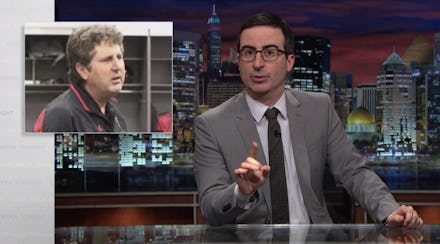John Oliver Gets to the Heart of the NCAA's Unpaid Player Problem

Should college ball be a paying job? For many within college athletics and the NCAA, the answer is no. But for many, many people outside of that world — and for the players themselves — the answer is a resounding yes.
Last year, federal judge Claudia Wilken ruled that the NCAA was required to allow colleges to pay student-athletes. That case that is currently being appealed, but on Sunday, John Oliver and the Last Week Tonight team took the occasion of March Madness to dive into the issue of pay for college athletes. In the process, he happened upon the heart of the issue: Too many parties involved have conflicted interests.
If it was just about pay, that'd be one thing. But the NCAA's precision in enforcing rules leads to inhumane situations. "Some rule enforcements go from the petty to the downright heartless," Oliver said, noting one player who insisted he wouldn't get properly fed some days.
But even if the issue was just player pay, it's an important one. Schools and the NCAA insist a free education is the compensation. Of course, as Oliver pointed out, that's provided one could actually take advantage of that education. The schedule for a student-athlete, between meetings and practices and workouts, not to mention games, is exhausting.
"I would love for a regular student to have a student-athlete's schedule for just one quarter, or one season or semester," Seattle Seahawks cornerback Richard Sherman said in one press conference about the "free education" compensation. "Show me how you balance that."
And of course, compensation can't be expected after college when a player moves on to play professionally, either, because less than 2% of college athletes go on to a pro league.
So, as it stands, the NCAA is an organization with a vested interest in keeping things exactly as they are, responsible for a group of players who need things to change. What's the next step out of that conflict of interest?
Oliver is pointing at a larger truth: The NCAA is not the organization to trust on the issue of player pay and treatment. They've got too much skin in the game; too much profit is on the line. That's why college sports need commissioners to provide oversight and rule on issues like these. The head could be chosen like baseball commissioners are — by vote of the schools involved (versus by vote of the teams's owners). This person should be free of influence from the NCAA, able to make decisions with clarity and from a neutral place, with a mind not just for profits but for justice towards other humans.
The complicated politics of college sports may make instituting such a commission impossible, and yet that's exactly why it is necessary. It's a bit of an ouroboros; the question is how much longer players and schools will allow the injustices to stand before demanding change.